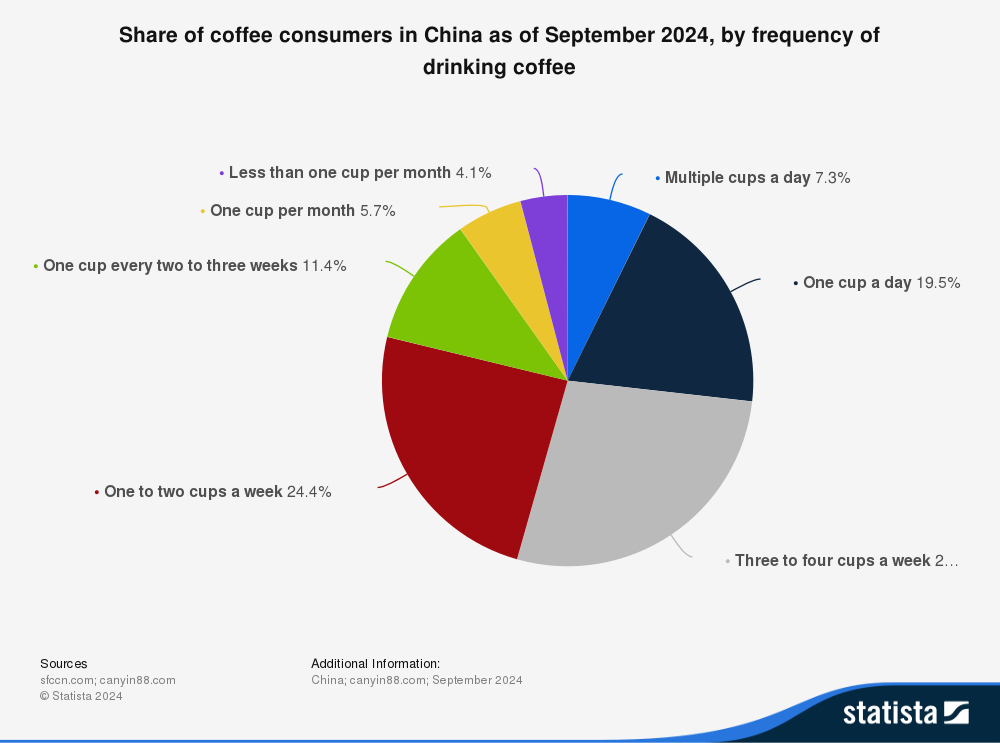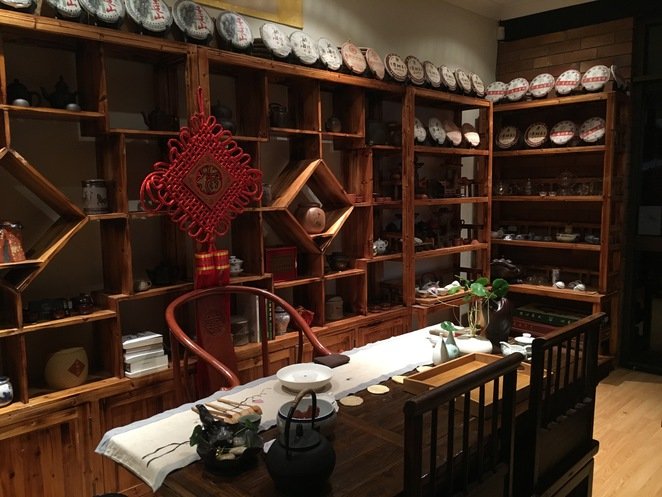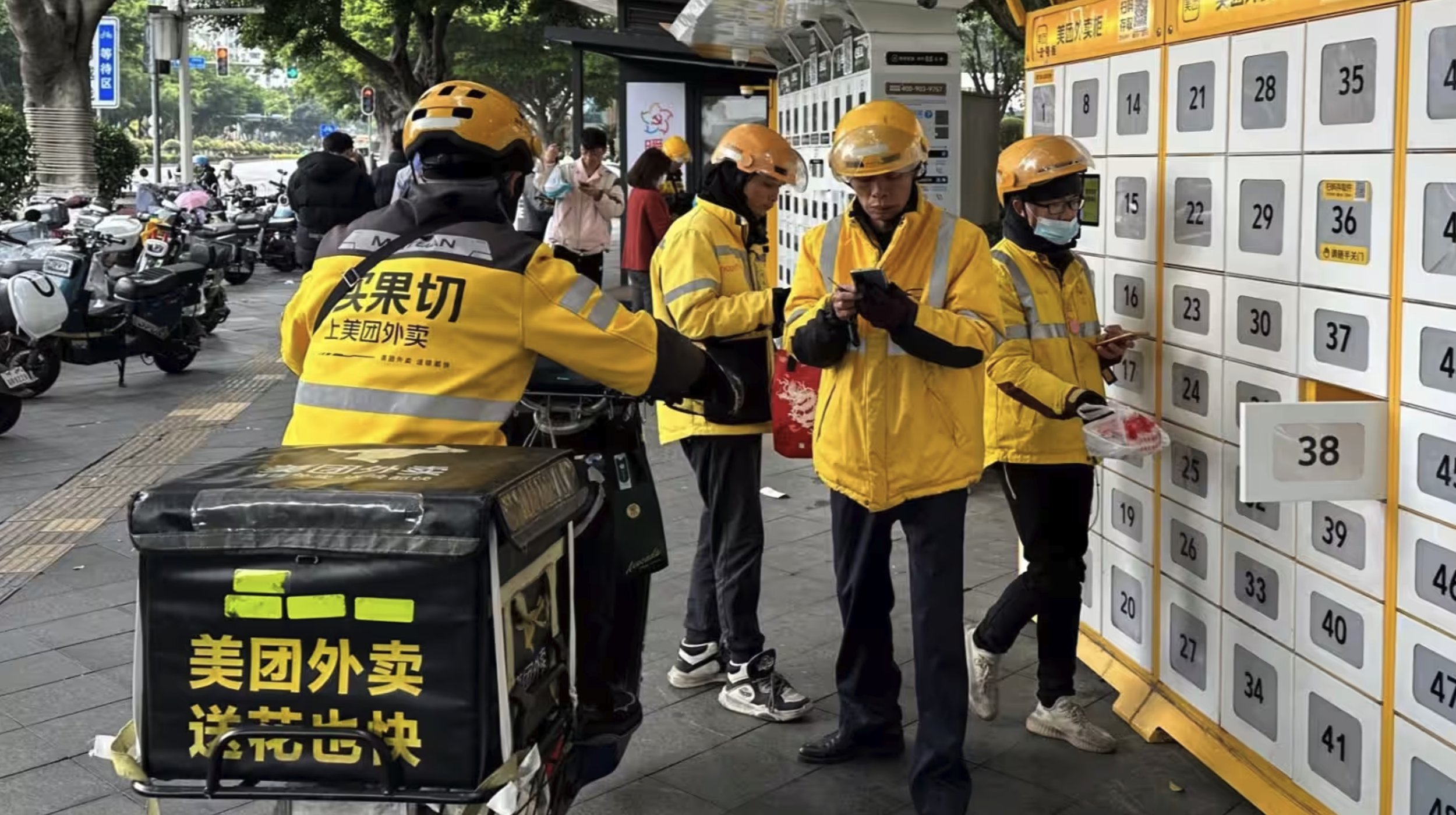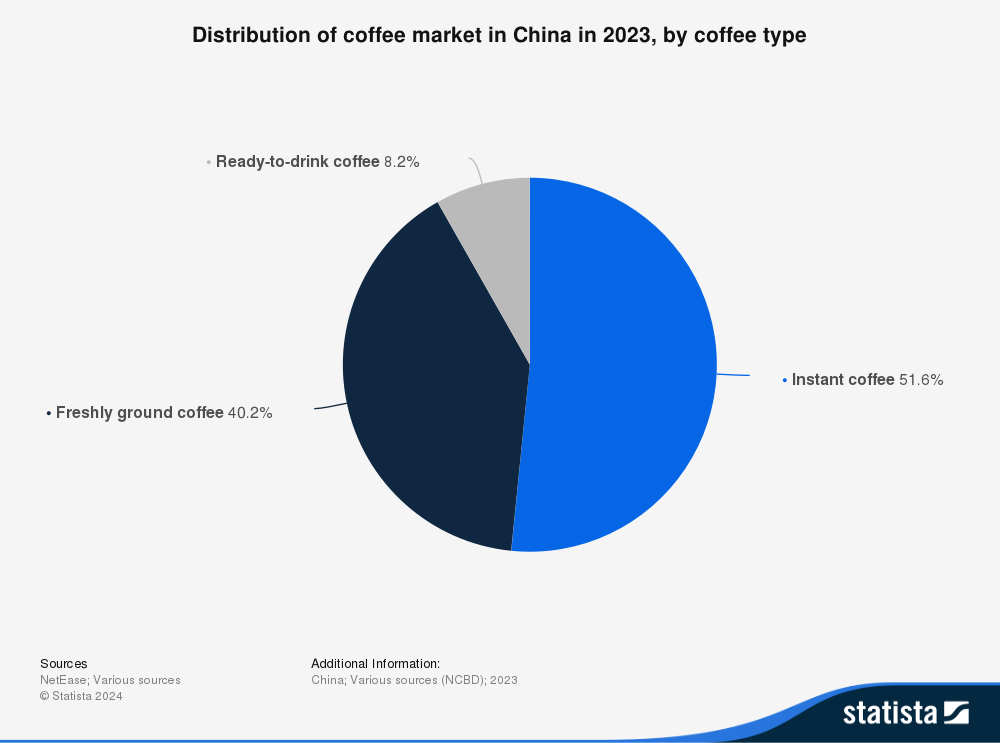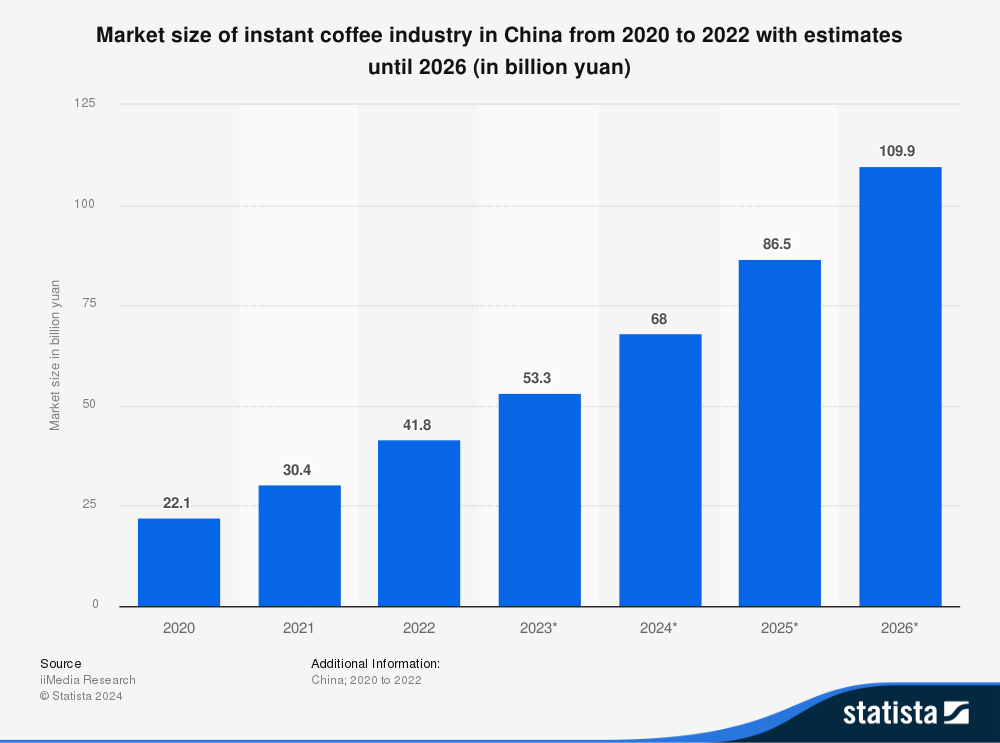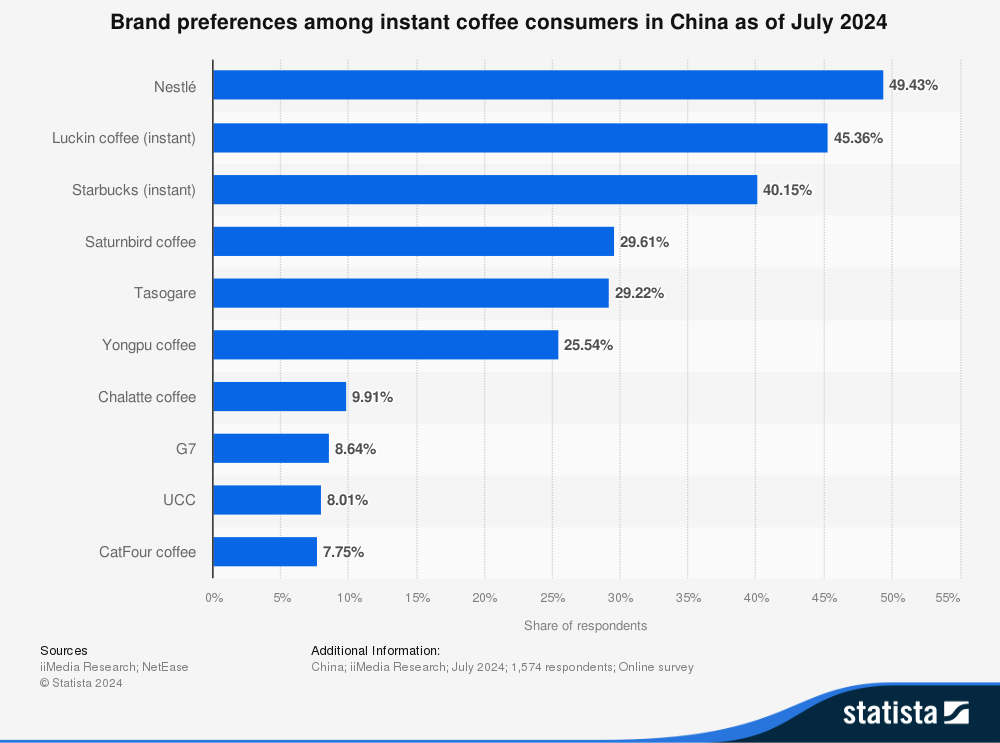The Growing Coffee Market in China
China's coffee market has experienced remarkable growth over the last decade, evolving from a niche interest to a thriving industry with vast opportunities for international brands. With urbanization and shifting consumer behaviors, coffee is becoming an integral part of millions of Chinese consumers' lifestyles. This blog explores the changing coffee consumption patterns in China, highlights consumer preferences and brewing practices, and identifies emerging market trends and opportunities for coffee brands.
The coffee market size in China shows significant growth from 2020 to 2024.
China currently ranks sixth globally in coffee sales revenue. Given the country's size and coffee consumption growth trends, this is expected to change in the coming years, with China likely settling into the number two position.
Those who drink coffee in China don't consume it regularly yet. For most coffee drinkers, it remains a novelty they occasionally try. Only about 25% of Chinese coffee drinkers have it daily. This presents a great opportunity for future growth as more people incorporate it into their daily routine.
Evolving Preferences Among Chinese Consumers
China, a country deeply rooted in tea culture, is witnessing a surge in coffee consumption, particularly among younger urban populations. For the older generation, tea remains a cherished tradition, integral to daily routines. Many homes feature dedicated tea rooms or tables for preparation, emphasizing tea's enduring cultural importance. While older demographics lean towards inexpensive instant coffee when experimenting, younger consumers are driving demand for premium coffee products.
A tea room in China. People can find them in both cities and the countryside. Many families have a simplified version of this at home, complete with a selection of different types of tea, cups, and other tools for preparing tea.
This dynamic market has grown at an impressive annual rate of over 30% in the past decade. In 2013, coffee consumption was relatively modest, with the market dominated by instant coffee. By 2023, the market value had skyrocketed from approximately $2.5 billion to over $14 billion, fueled by the proliferation of coffee shops, e-commerce platforms, and premium coffee's increasing appeal to younger consumers.
The distribution of coffee consumers by age clearly shows that coffee is popular primarily among the younger generation, with 68% of consumers being under 30 years old.
Urban migration and exposure to global coffee culture through travel and social media have significantly influenced consumer preferences. Rising incomes empower Chinese consumers to explore high-quality coffee products and experiences. Coffee shops have become fashionable social hubs, especially for millennials and Gen Z, offering trendy environments for socializing, studying, or working.
Coffee Shops as Cultural Hubs
Major cities like Shanghai, Beijing, and Guangzhou lead China’s coffee revolution, with Shanghai alone having over 8,000 coffee shops—surpassing cities like New York and London. These range from global chains like Starbucks to boutique artisanal coffeehouses, offering diverse experiences from handcrafted pour-over coffee to nitro cold brews.
Shanghai has over 8,000 coffee shops, more than both New York and London. Some are small spots without seating, while others are trendy places perfect for meeting with friends. Ordering through an app and picking up coffee on the way to work is common.
Luckin Coffee is the leading coffee shop franchise in China, surpassing Starbucks, for whom China is the second-largest market. Luckin offers a broad variety of coffee drinks, including special editions and flavors tailored specifically for Chinese customers, which are unavailable elsewhere. This, along with their pricing being significantly lower than Starbucks, contributes to their popularity and sustained growth.
Delivery services like Elema and Meituan have further fueled coffee's popularity. These platforms allow millions of users to order food and drinks, including coffee, with deliveries often arriving within 20 to 30 minutes at costs as low as $0.30 to $0.70 USD. Delivery workers on electric scooters ensure consistency regardless of weather, enabling consumers to enjoy coffee at home, in the office, or on the go. Most coffee shops partner with these platforms to expand their reach, offering exclusive deals and promotions.
Meituan and Elema are the leading delivery services in China, operating nationwide. Riders deliver food and drinks on electric scooters directly to homes, offices, or drop-off boxes. Fast and affordable, people often order more than three times a day.
In Tier 1 cities like Shanghai, Beijing, and Shenzhen, coffee consumption reflects modernity and sophistication, with consumers exploring premium and specialty offerings. Conversely, smaller cities often lack the diversity of coffee shops, with traditional tea consumption remaining prevalent. However, digital platforms and affordable instant coffee are gradually introducing coffee culture to these regions.
Tea Is Putting Up a Fight
While traditional tea rituals and preparation methods resonate more with older generations, tea culture has evolved to cater to younger consumers too. Modern tea shops like Heytea and Coco are competing directly with coffee chains by offering various tea blends infused with tapioca pearls, fruit flavors, and unique textures. These brands have established themselves with thousands of outlets across China and even expansions into overseas markets.
Tapioca, cream, sugar, and ice—that's modern tea in China, and the young generation has fallen in love with it.
Heytea is one of the leading brands in modern tea in China. A quick glance at the menu, and you might not even realize it's tea.
Coffee Production in China
China’s coffee production is concentrated in southern provinces, with Yunnan accounting for over 95% of total output. Known for its specialty-grade Arabica beans, Yunnan benefits from ideal altitude, climate, and soil conditions. Hainan and Fujian, producing smaller amounts of Robusta coffee, cater to the instant coffee segment.
Yunnan’s coffee industry began in the late 19th century and gained momentum in the 1980s through government initiatives and international investment. Today, Yunnan’s beans are recognized globally, with a growing share exported to Europe, North America, and East Asia. Domestically, these beans cater to the premium coffee market, increasingly valued by Chinese consumers.
The Rise of Home Brewing
Home brewing has gained traction, particularly since the COVID-19 pandemic. Chinese consumers are exploring various preparation methods.
Like in most markets, instant coffee dominates the coffee market in China. However, freshly ground coffee is not far behind, holding a 40% market share. Many instant coffee drinkers will likely transition to capsule coffee before moving on to full coffee preparation at home.
Instant Coffee: Instant coffee is particularly popular among older generations and residents in smaller cities, where the culture of freshly brewed coffee is less prevalent. Instant coffee's dominance in these demographics is driven by its simplicity, with many products offering sweetened or milk-based varieties that align with Chinese flavor preferences. Leading brands like Nestlé have responded by introducing premium instant coffee options that emphasize richer flavors and higher-quality ingredients.
Instant coffee often serves as the first experience with home brewing for many people and is showing strong growth. From this point, people are expected to progress to other coffee preparation methods, and this growth will likely extend to other areas.
The instant coffee market is currently dominated by global players, but new local brands are recognizing opportunities and increasingly entering the market to capture market share.
Capsule Machines: The popularity of capsule systems like Nespresso is growing among middle- and upper-income households. These systems appeal to Chinese consumers for their convenience, consistent quality, and modern design. Domestic competitors are entering the market with localized flavors, such as red bean or jasmine-infused coffee, and more affordable alternatives, further boosting this segment. Capsule coffee's growth is also fueled by its strong presence on e-commerce platforms, allowing easy access and promotions targeting buyers. As interest in premium coffee grows, capsule systems offer a middle ground between instant coffee and more labor-intensive brewing methods.
Pour-Over and Specialty Brewing: Enthusiasts are embracing pour-over techniques and other methods like French press and AeroPress, reflecting a growing appreciation for high-quality coffee. Specialty coffee shops and influencers play a key role in popularizing these brewing styles.
Drip Bags: Drip bags offer convenience and premium taste, allowing consumers to enjoy high-quality coffee without additional equipment. They align with the growing trend of specialty coffee, showcasing unique bean profiles in a portable format.
Key Trends in Coffee Consumption
Premiumization
Chinese consumers are increasingly willing to pay for high-quality coffee, including specialty beans, ground coffee, and premium capsules. The focus on craftsmanship and storytelling enhances the appeal of these products.
Cold Brew and Ready-to-Drink Coffee
Cold brew and RTD coffee products are widely available in convenience stores across China, catering to diverse price points and consumer preferences. Brands like Costa and Starbucks dominate the premium segment, offering high-quality options that appeal to affluent urban consumers. Meanwhile, local and Japanese brands provide affordable alternatives. There is still significant space in the market for new brands to specialize in niche types of coffee or unique flavor profiles.
E-Commerce Dominance
China’s e-commerce ecosystem provides huge opportunities for coffee brands. Platforms like Tmall and JD.com, coupled with social commerce apps like Xiaohongshu, enable seamless purchases, influencer promotions, and subscription services.
Cafés in More Cities
Opening coffee shops in lower-tier cities presents a significant growth opportunity for the coffee industry. While Tier 1 and Tier 2 cities like Shanghai, Beijing, and Shenzhen already boast a staggering number of coffee shops, lower-tier cities remain relatively untapped markets. These cities offer the chance to introduce coffee culture to a wider audience.
Marketing Strategies in China
Marketing in China requires an understanding of the local culture, consumer behaviors, and physical and digital ecosystems.
Инфлюенс-маркетинг
Key Opinion Leaders (KOLs) on platforms like WeChat, Xiaohongshu, and Douyin are essential for promoting coffee products. Collaborations with influencers can take many forms, including product reviews, live-streams, exclusive promotional codes, or even co-branded product launches. These partnerships are structured based on the influencer's reach and engagement, with pricing ranging from a few thousand RMB for micro-influencers to hundreds of thousands for top-tier KOLs. Influencers are highly trusted in China partly because of a history of scandals involving dishonest advertising and misleading claims, which have made consumers more skeptical of traditional marketing. Influencers are perceived as more authentic due to their relatable and personal content. However, in recent years, some influencers have begun prioritizing paid promotions over authenticity, leading to diminished trust in certain cases. Despite this, conversion rates remain high when the right influencers are selected, as their opinions continue to carry significant weight with followers. This makes influencer marketing a highly effective strategy in China’s digital ecosystem when executed thoughtfully.
The way bloggers and livestreamers operate in China is quite foreign to most Westerners. Engaging with Key Opinion Leaders (KOLs) is more important in China than anywhere else in the world.
China’s Digital Ecosystem
With Western platforms blocked, brands must build a presence on local platforms like WeChat, Tmall, and Douyin. Each platform has specific requirements for opening and managing accounts, with options for local and cross-border accounts depending on whether the business operates domestically or internationally. Local accounts require a Chinese business license, while cross-border accounts do not. Account and brand verification processes typically involve submitting documentation, such as business licenses, trademarks, and identification, to ensure legitimacy and compliance with Chinese regulations. Livestreaming and shopping festivals like Singles' Day offer significant opportunities for engagement and sales, making it crucial for brands to establish a verified and optimized presence on these platforms.
Localized Campaigns
Tailoring campaigns to Chinese tastes is crucial. Selecting a culturally appropriate Chinese name, informed by focus groups, is a key step. Campaigns tied to traditional festivals or featuring localized flavors can resonate deeply with consumers.
Offline Sales Channels
Supermarkets, convenience stores, and specialty coffee shops are key locations for selling packaged coffee products and brewing equipment. Instant coffee is commonly found in supermarkets and convenience stores, appealing to consumers seeking affordability and convenience. Coffee capsules are often sold through more premium supermarkets and specialized retailers, as well as e-commerce platforms, targeting middle- and upper-income households. Whole coffee beans and ground coffee, especially those marketed as specialty or premium products, are frequently available in specialty coffee shops, boutique stores, premium supermarkets, and online platforms, catering to coffee enthusiasts and home brewing enthusiasts. Convenience stores, in particular, offer ready-to-drink (RTD) coffee.
Ole is one of the premium supermarkets that offers a variety of coffee beans and capsules.
Building relationships with offline retail partners in China requires the involvement of skilled sales representatives who understand local market dynamics. Establishing these partnerships involves significant effort to negotiate contracts, and build trust. Many retailers value long-term relationships, which means maintaining consistent communication and delivering on commitments is essential. It often takes years to solidify these partnerships, as Chinese business culture prioritizes reliability and strong personal connections.
Conclusion
China's coffee market is booming, presenting vast opportunities for brands willing to adapt to local preferences. From influencer-driven marketing to localized flavors, coffee brands have great potential to thrive in this dynamic and fast-evolving market.


